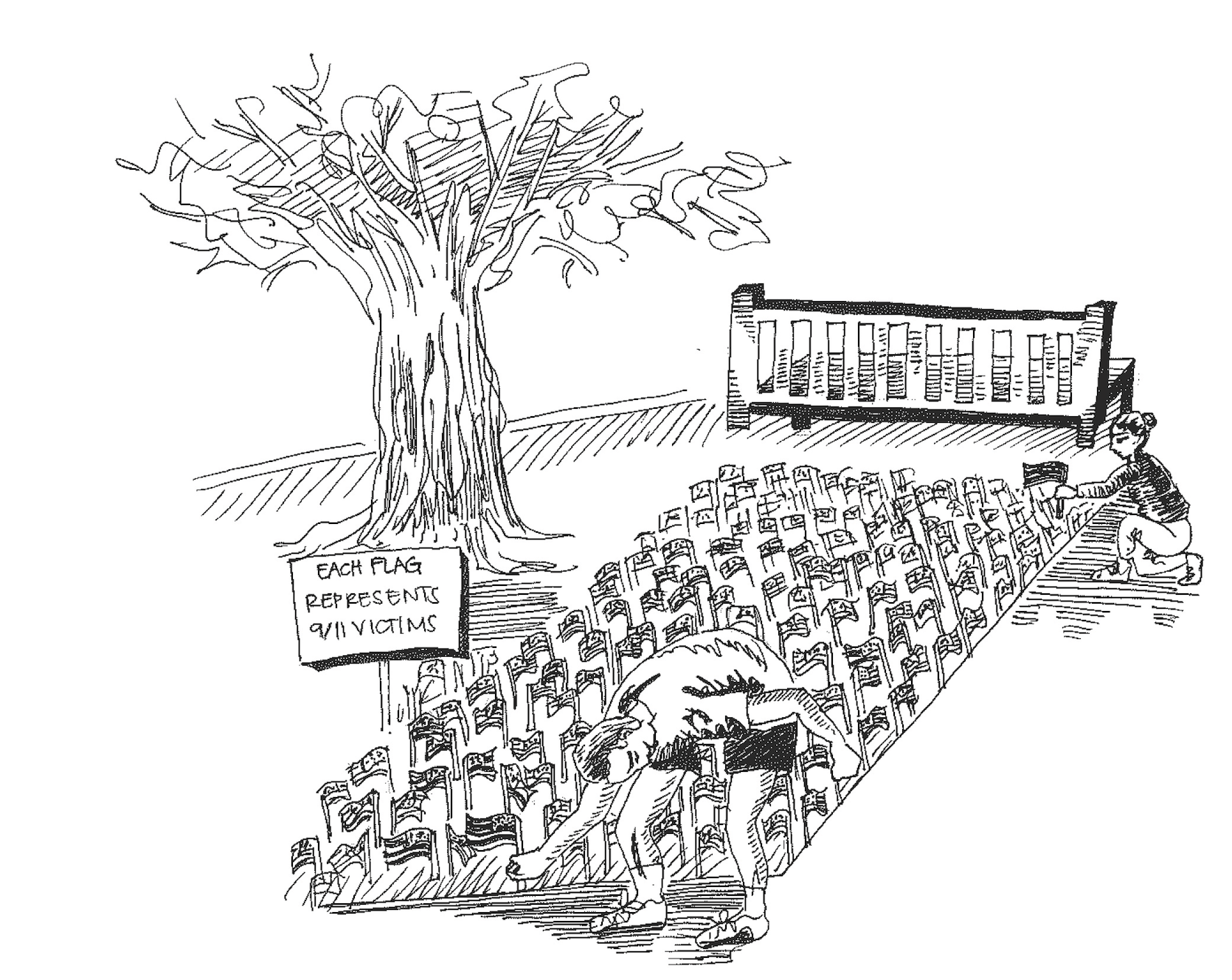The Occidental Conservatives Club placed American flags on the Academic Quad Sept. 11 in remembrance of the victims of the 9/11 terror attacks. Unlike last year, no students decided to deface the memorial as a political statement. There haven’t been any photos of Occidental trash cans stuffed full of star-spangled banners posted on CNN. Instead, some students respectfully protested by writing with chalk on the quad. The day passed without controversy, and it felt like progress had been made.
Or so it seemed. I think it’s time to revisit the issues raised by the damaging of the flags. The casual disrespect of others’ speech inherent in the incident reflects the growing national acceptance for censorship in the name of comfort, safety and equality. College campuses across the country are wrestling with the same issue. Our generation, like generations before us, has to decide whether or not free speech is worth protecting; the different responses to the 9/11 memorials of this year and last represent the two options. Yet, we should and must choose to follow the example set this year and respect the opinions of those we disagree with, even if we find them distasteful.
Last February, when the University of California, Berkeley canceled a speech from conservative shock artist (and embarrassment to Milos everywhere) Milo Yiannopoulos because of the violent protests that surrounded his arrival on campus, it was a clear demonstration of students’ ability to silence speech. As a fervent supporter of the First Amendment, this was troubling. College administrations across the country have surrendered to the wills of vocal minorities and let them veto speakers and censure their peers. The Dean of Students at the University of Chicago wrote a letter to incoming first years to this effect:
“Diversity of opinion and background is a fundamental strength of our community,” he said. “The members of our community must have the freedom to espouse and explore a wide range of ideas.”
And to be fair, the Occidental protesters were advocating for a sort of diversity themselves: diversity of recognition, summarized by the posters they left behind:
“R.I.P. to the 2,996 Americans who died in 9/11. R.I.P. to the 1,455,590 innocent Iraqis who died during the U.S. invasion for something they didn’t do,” the posters read.
This is absolutely valid. Men, women and children in the Middle East have died for our desire for vengeance, they have died for our greed and they have died for our ignorance. They should not be forgotten by America or Occidental simply because they weren’t U.S. citizens. The protesters had a right to be angry, and I can understand how that anger might cause them to act rashly.
Still, rash actions with good intentions can strangle free speech and create an environment of intolerance on campus just as easily as bigoted ones can. Since I’m a Politics major, I often find myself in classes where we discuss controversial issues. Such discussions are often more interesting when both sides are represented in the classroom. If a classroom agrees on everything, it’s just a sea of bobbing heads. Several of my professors have actively called upon students to disagree and take the other side of the argument, usually the conservative one. They rarely get a response.
We frequently worry about what our classmates might think of us if we defend the immigration ban or voter ID laws. Someone shouldn’t be worried about repercussions when they decide whether or not to chime in on a discussion of the First Amendment.
Just because I defend abhorrent speech doesn’t mean I like it, but it is a necessary evil in the service of a greater good. After all, allowing such distasteful speech lets us learn why and how it’s wrong. So next time someone says something in your CSP that you find intolerable or puts up a flier in the Cooler that you disagree with, don’t tear it down. Ask them to sit down with you in the Green Bean. Talk to them, listen to them. Real courage is being willing to admit that you might be wrong, not skulking around in the early morning and vandalizing flags.
This year’s 9/11 memorial and protests prove that we can engage with each other respectfully, even over the most emotional topics. We should continue in its spirit. Thanks to all the attention we received, Occidental is at the center of a debate that spans the country — a debate about what values are important to us. Our community has a chance to lead. But first, we have to decide if we want to reaffirm the unique American commitment to protecting neo-Nazis and far-left anarchists alike or be the ones that let it wither.
Milo Goodell is a sophomore Politics major. He can be reached at mgoodell@oxy.edu
![]()































